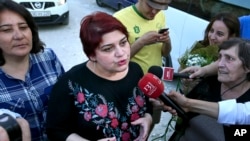Azerbaijani investigative reporter Khadija Ismayilova welcomed a ruling Thursday from the European Court of Human Rights, which denounced her 2015 imprisonment and lengthy detention as a politically motivated effort to “silence and punish her for her work.”
"This is an important decision because it shows how far the authoritarian regime will go in order to silence critics," Ismayilova told VOA, adding that the court ruling could have gone further.
The court "confirmed that the there was no crime committed, and no suspicion of a crime, but also that the government tried to produce evidence by implementing coercion," Ismayilova said. "It would be good to have more clear wording on what the government is expected to do.
"Besides paying the compensation," she added, "it's important that the government [would be required to] punish the perpetrators — those who falsified the evidence for implementing this arrest."
Azerbaijan sentenced Ismayilova to 7-1/2 years in prison in 2015 on what human rights groups called trumped-up charges of tax evasion and "abuse of power." After spending 537 days in prison, she was conditionally released in 2016 but remains subject to a travel ban.
In 2009, Ismayilova began investigating assets held by the family of Azerbaijani President Ilham Aliyev. She was soon invited to join a massive, broadly collaborative investigation by the Organized Crime and Corruption Reporting Project (OCCRP) about a complex money-laundering scheme that saw $2.9 billion flow through four U.K.-registered shell companies over a two-year period.
In its Feb. 27 ruling, the Strasbourg-based court said it had found that one charge in particular against Ismayilova was “based on a false complaint made under coercion,” while other charges were “not backed up by facts.”
It also ordered oil-rich Azerbaijan to pay Ismayilova 25,000 euros ($27,400) in damages and annul a nearly 5-year-old ban on her travel.
Asked whether she expected the government to comply, Ismayilova was skeptical. Of three ECHR rulings since her 2015 imprisonment, the government has only once issued funds to a bank account in Ismayilova's name, and that payment was promptly suspended.
"I had another ruling, and the government paid the compensation but froze my account so I couldn't use those funds," she said. "That is how the government acts."
Although the Baku-based 43-year-old Azerbaijani national continues to publish investigative reports on wide-ranging state corruption and illicit finance, she says the court rulings haven't ended her fears of being sent back to prison.
"Oh, it's always a possibility," she said. "There's always a feeling like I'm being monitored. I'm [under] surveillance, I can feel it, and I expect anything from the government.
"Right now my accounts are frozen, I'm on the travel ban, and the government refuses to stop the probation period although it is my right," she said. On Feb. 6, the Azerbaijani Supreme Court upheld the travel ban despite laws that allow it to be lifted after half the time has elapsed.
Even if the travel ban is lifted, she said, "I'm not planning to move anywhere."
"I will of course use my freedom to travel, but ... it's my country and no one can force me out," she said. "I want to stay here and be useful to my country."
Ismayilova briefly managed Radio Azadliq, the Baku bureau of U.S.-funded Radio Free Europe/Radio Liberty's (RFE/RL's) Azerbaijani language service, a VOA sister network.
In 2009, President Aliyev banned Western broadcasters such as RFE/RL, BBC and VOA from local frequencies, significantly diminishing the reach of these outlets in Azerbaijan.
In 2012 Ismayilova joined a team of reporters who discovered that members of Aliyev's family held sizable stakes in a new gold and silver mine that blocked villagers’ access to land and water.
Shortly after the report was published, Ismayilova, who was then freelancing for Radio Azadliq, received anonymous threats warning her to "behave" or face being defamed.
She was detained by police on Dec. 5, 2014, one day after state media published a 60-page essay by Aliyev's chief of staff Ramiz Mehdiyev, in which he warned Radio Azadliq employees against serving "foreign patrons," and accusing Ismayilova individually of treason.
She was sentenced to prison in September 2015.
Although Thursday's ECHR ruling is binding under the European Convention on Human Rights, the court is not authorized to overrule or annul national court decisions.
If Azerbaijan refuses to comply with the latest ruling, Ismayilova said she plans to follow up with the Committee of Ministers of the Council of Europe, the body responsible for enforcing the court's judgments.“
We call on the Azerbaijani authorities to lift all unlawful restrictions, quash the outstanding convictions against Khadija Ismayilova and comply with the court’s ruling to pay her compensation," said Denis Krivosheev, Amnesty International’s deputy director for Eastern Europe and Central Asia, in a prepared statement.
"They must also stop misusing the law for politically motivated prosecutions designed to silence peaceful critics.”
U.S. Senator Ben Cardin of Maryland, the ranking Democrat on the U.S. Helsinki Commission, has repeatedly called for Ismayilova's acquittal on all charges, as have Republican leaders such as the late Senator John McCain of Arizona. Ranking members of the Helsinki Commission did not respond to requests for comment in time for publication.
The State Department has advocated for Ismayilova's release since 2015.
In its 2019 annual World Press Freedom Index, Paris-based Reporters Without Borders ranks Azerbaijan 166 out of 180 countries, in which one is considered the most free.




